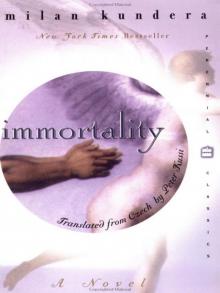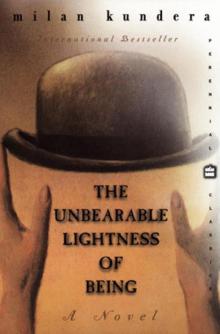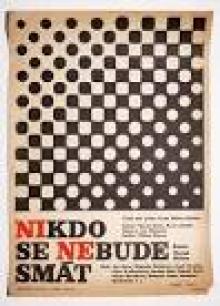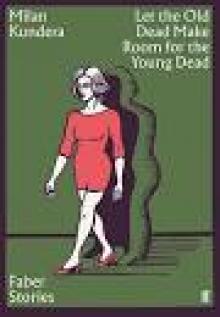- Home
- Milan Kundera
Jacques and His Master: An Homage to Diderot in Three Acts Page 7
Jacques and His Master: An Homage to Diderot in Three Acts Read online
Page 7
Jacques (showing him): Like this, sir!
Master: Agathe all over. (With indignation.) Oh, the slut!
I'd have treated her a good deal worse than the Marquis des Arcis treated that little cheat of his! Or Young Bigre his Justine!
(Saint-Ouen has appeared on the platform and is following the conversation between Jacques and his Master with great interest.)
Saint-Ouen: And why didn't you?
Jacques (to his Master): Do you hear him mock you? He's a scoundrel, sir. I told you so the first time you mentioned him to me.
Master: He's a scoundrel, all right, but for the moment he's done no more than what you did to your friend Bigre.
Jacques: Yet clearly only he is a scoundrel, not I.
Master (struck by the veracity of Jacques's remark): Why, that's true. You both seduce your best friends' women, yet only he is a scoundrel, and not you. How do you explain that?
Jacques: I don't know, sir. But I have a feeling that in the depths of that riddle there hides a profound truth.
Master: Of course! And I know what it is! The difference between the two of you is not in your deeds but in your souls! You cuckolded your friend Bigre, but then you drowned your sorrows.
Jacques: I hate to destroy your illusions, but I wasn't drowning my sorrows, I was celebrating. . . .
Master: You mean you didn't get drunk out of remorse?
Jacques: It's shameful, I know, but that's how it is.
Master: Jacques, would you do something for me?
Jacques: For you? Anything you ask.
Master: Let's agree that you were drowning your sorrows.
Jacques: If that is what you wish, sir.
Master: That is what I wish.
Jacques: So be it, sir. I was drowning my sorrows.
Master: Thank you. I want to distinguish you as clearly as possible from that scoundrel (turning toward Saint-Ouen, who is still on the platform), who, by the way, was not content merely to cuckold me. . . . (He mounts the platform.)
Scene 2
Saint-Ouen: Dear friend! The time has come to think of revenge! And since she has harmed us both, the wretch, I propose we avenge ourselves together!
Jacques: Yes, I remember. That's where we left off. Well, sir! What did you tell the rat?
Master (looking at Jacques from the platform, pathetically): What did I tell him? Look at me, Jacques. Look at me, my boy. Look at me and weep at my fate! (To Saint-Ouen.) Listen, Saint-Ouen, I'm willing to put your betrayal behind me on one condition.
Jacques: Good for you, Master! Don't let him push you around!
Saint-Ouen: Anything you say. Shall I jump out of the window? (The Master smiles and does not respond.) Hang myself? (The Master does not respond.) Drown myself? (The Master does not respond.) Plunge a knife into my
breast? Yes, yes! (He tears open his shirt, picks up a knife, and points it at his chest.)
Master: Put down that knife. (He grabs it from his hand.) Come, let's have a drink, and then I'll reveal the severe condition you must satisfy to win my pardon. ... So Agathe is as passionate as she looks!
Saint-Ouen: Ah, if only you could know her as I do!
Jacques (to Saint-Ouen): Has she got long legs?
Saint-Ouen (to Jacques, softly): Not particularly.
Jacques: And a nice big bottom?
Saint-Ouen (the same): Flat as a board.
Jacques (to his Master): I see you are a dreamer, sir, and love you all the more for it.
Master (to Saint-Ouen): Let me state my condition. While we empty this bottle, I want you to talk to me about Agathe. You'll tell me what she's like in bed, what she says. How she moves. What she does. Her sighs. You'll tell me, we'll drink, and I'll imagine it. . . . (Saint-Ouen stares at the Master without responding.) Well? Are you willing? What's the matter? Speak! (Saint-Ouen remains silent.) Do you hear me?
Saint-Ouen: I do.
Master: Do you agree?
Saint-Ouen: I do.
Master: Then why don't you drink?
Saint-Ouen: I'm looking at you.
Master: I can see that.
Saint-Ouen: We're the same height. In the dark, one of us could easily be mistaken for the other.
Master: Well, and what of it? Why don't you start? I want to imagine it! Damn it all, Saint-Ouen, I can't wait! I want you to tell me now!
Saint-Ouen: So you want me to describe a night with Agathe?
Master: You don't know what passion is! Yes, I want you to! Is that too much to ask?
Saint-Ouen: On the contrary. It's a mere trifle. Indeed, what would you say if instead of describing the night, I gave you the night itself?
Master: The night itself? A real night?
Saint-Ouen (taking two keys from his pocket): The small one opens the front door; the large one, the door to Agathe's antechamber. I've been using them for six months, my friend. I stroll along the street until a potted basil plant appears in the window. I open the door of the house and close it quietly. Quietly I climb the stairs. Quietly I unlock her door. Off the antechamber is an alcove, where I undress. Agathe leaves the door to her bedchamber ajar and awaits me there in her bed, in the dark.
Master: And you'd let me take your place?
Saint-Ouen: With all my heart. I have only one small request. . . .
Master: Name it!
Saint-Ouen: May I?
Master: By all means. I want no more than to make you happy.
Saint-Ouen: You're the best friend a man has ever had.
Master: No worse than you. Now then, what can I do for you?
Saint-Ouen: I'd like you to remain in her arms until morning. Then I'll happen on the scene and surprise you.
Master (with a rather shocked little laugh): Splendid idea! But isn't it a bit cruel?
Saint-Ouen: Cruel? Not very. Droll, actually. I, too, shall undress in the alcove, and when I surprise you, I'll be . . .
Master: Naked! Oh, the perfect profligate! But how shall we manage? We've only one set of keys. . . .
Saint-Ouen: We enter the house together, undress together in the alcove, but you go in to her first. Then as soon as you're ready, you give me a signal and I join you!
Master: An excellent idea! It's divine!
Saint-Ouen: Then you agree?
Master: Of course! But . . .
Saint-Ouen: But . . .
Master: But . . . You see, I . . . No, no, I agree without reservation. Except that, well, since this is the first time, I'd actually prefer to be alone with her. . . . Perhaps later we could . . .
Saint-Ouen: Ah, I see. You intend to avenge us several times over.
Master: The revenge is so sweet . . .
Saint-Ouen: How true. (He nods upstage, where Agathe is lying on a step. The Master moves toward her as if under a spell, and she holds her arms out to him.) Careful! Quiet! The whole house is asleep! (The Master lies down next to Agathe and takes her in his arms. . . .)
Jacques: I congratulate you, sir, but I fear for you.
Saint-Ouen (from the platform, to Jacques): According to
all the rules, my friend, a servant should rejoice to see his master duped.
Jacques: My master is a good fellow; he does as I say. I don't like to see other masters, not such good fellows, leading him by the nose.
Saint-Ouen: Your master is a moron and deserves a moron's fate.
Jacques: In some ways perhaps he is a fool. But there's a gentle wisdom to his follies, a wisdom I don't find in your cleverness.
Saint-Ouen: Well, well! A servant enamored of his master! Watch closely and see what this adventure gets him!
Jacques: In the meantime he's happy, and I'm happy for him!
Saint-Ouen: We shall see!
Jacques: In the meantime he's happy, I tell you, and that's good enough for me. What more can one ask than to be happy in the meantime?
Saint-Ouen: Well, he'll pay dearly for his moment of happiness!
Jacques: But what if his moment o
f happiness is so great that even all the misfortunes you've prepared for him will not outweigh it?
Saint-Ouen: Hold your tongue, servant! If I thought I'd given your dolt of a master more pleasure than pain, I'd indeed run this knife through my heart. (He calls upstage into the wings.) Quickly, there! Quickly! It's nearly daybreak!
Scene 3
A great commotion is heard offstage. Then a group of people, including Agathe's Mother and Father in nightclothes, and the Police Officer, rush over to the step where the Master and Agathe lie entwined.
Police Officer: Quiet, ladies and gentlemen! The evidence is conclusive. Caught in the act. The culprit, if I am not mistaken, is an aristocrat and an honorable man. I trust he will right this wrong on his own rather than wait till the law constrains him to it.
Jacques: Good God, sir, now they've got you where they want you.
Agathe's Father (holding back Agathe's Mother, who is trying to beat Agathe,): Let her be! Everything will turn out for the best. . . .
Agathe's Mother (to the Master): You seemed so honorable. Who'd have thought that you would . . .
Police Officer (to the Master, who has in the meantime picked himself up from the step): Follow me, sir.
Master: And where do you propose to take me?
Police Officer (leading him off): To prison.
Jacques (stunned): To prison?
Master (to Jacques): Yes, Jacques, my boy, to prison . . .
(The Police Officer exits. The small group that had formed in the vicinity of the step disappears. The Master is alone on the platform. Saint-Ouen rushes over to him.)
Saint-Ouen: Oh, my dear, dear friend! How perfectly frightful! You, in prison! How can it be? I've just now come from Agathe's. Her parents refuse to speak to me. They know you're my only friend and blame me for their misfortune. Agathe nearly scratched out my eyes. You understand her position. . . .
Master: You alone, Saint-Ouen, can get me out.
Saint-Ouen: But how?
Master: How? By telling the truth.
Saint-Ouen: Yes, and I've threatened Agathe to do just that. But I can't go through with it. Think of what we two would look like. . . . Besides, it's all your fault!
Master: My fault?
Saint-Ouen: Yes, yours! If you had agreed to my little nastiness, Agathe would have been caught between two men, and she would have ended up the fool. You were too selfish, my friend! You had to have her all to yourself!
Master: Saint-Ouen!
Saint-Ouen: That's how it is, my friend.You're being punished for your selfishness.
Master (reproachfully): My friend!
(Saint-Ouen turns on his heel and exits.)
Jacques (calling to the Master): Damn it all! When are you going to stop calling him your friend? Everybody knows that it was all a trap, that he was the one who denounced you! But no, you'll always be blind! And I'll be a laughingstock for having an imbecile for a master!
Scene 4
Master (turning toward Jacques and stepping down from the platform during the speech): If only he were just an imbecile, Jacques, my boy. But he was unlucky besides, and that's worse. After I'd been released from prison, I had to cleanse their daughter's tainted honor with a considerable sum. . . .
Jacques (by way of consolation): It could have been still worse, sir. Supposing the girl had been pregnant.
Master: You've guessed it.
Jacques: What?
Master: Yes.
Jacques: She was knocked up? (The Master nods, and Jacques puts his arms around him.) Master! My poor little master! Now I know the worst of endings of a story.
(Throughout this scene, the dialogue between Jacques and his Master is imbued with genuine sadness and is completely free of comedy.)
Master: Not only did I pay for that little tart's tainted honor, I was ordered to pay for her confinement, to say nothing of the maintenance and upbringing of a little brat who is the repellent image of my friend Saint-Ouen.
Jacques: Now I know. The worst of endings of a human story is a brat. The sinister full stop at the end of the adventure. The blot at the end of love. And how old is he now, your son?
Master: Nearly ten. He's been in a village all this time,
and I plan to stop off there on our travels, settle my account with the people keeping him, and have the little snot apprenticed.
Jacques: Remember at the beginning when they (he nods at the audience) asked me where we were going and I answered,"Which of us knows where we're going?" Well, you knew all along, my sad little master.
Master: I think I'll make him a watchmaker. Or a carpenter. Yes, better a carpenter. He will make multitudes of chairs and multitudes of children and the children will make new chairs and new children who will beget new multitudes of children and chairs. . . .
Jacques: And the world will be cluttered with chairs, and that will be your revenge.
Master (with disgust): The grass will cease to grow, the flowers to bloom, and everywhere there will be only children and chairs.
Jacques: Children and chairs, chairs and children. It's a grim picture you paint of the future. How lucky we are, sir! We'll die in time.
Master (pensively): I certainly hope so, Jacques, because there are times when I feel great anxiety at the thought of the continual repetition of children and chairs and all that. . . . You know what I wondered yesterday evening as I listened to the story of Madame de La Pommeraye? Whether it isn't always one and the same story. After all, Madame de La Pommeraye is merely a replica of Saint-Ouen, while I am no more than a version of your poor friend Bigre, who himself is but a counterpart of that dupe of a Marquis. And I see no difference whatever between Justine and Agathe, and Agathe is the double of the little whore the Marquis eventually married.
Jacques (pensively): Yes, sir, it's like a merry-go-round.
You know, my grandfather, the one who kept me gagged and read the Bible every night, he didn't always like what he read, he would even say that the Bible repeated itself and that anyone who repeated himself took his listeners for idiots. And you know what I've been wondering, sir? Whether the one who does all the writing on high hasn't repeated himself an incredible amount and whether he, too, doesn't take us for idiots . . . (Jacques falls silent, and the Master is too sad to respond. After a pause, Jacques tries to console him.) But good God, sir, don't be so sad. What can I do to cheer you up? I know what, dear little Master. I'll tell you the story of how I fell in love.
Master (in a melancholy voice): Yes, tell me, Jacques, my boy.
Jacques: The day I lost my virginity, I went out and got drunk.
Master: Yes, I know.
Jacques: Oh, I'm sorry. Then I'll skip ahead to the surgeon's wife.
Master: So she's the one you fell in love with?
Jacques: No.
Master (looking around with sudden suspicion): Well, then, skip her too, and go on quickly.
Jacques: Why are you in such a hurry all of a sudden?
Master: Something tells me, Jacques, that we haven't much time.
Jacques: Sir, you scare me.
Master: Something tells me you'd better be quick about finishing your story.
Jacques: Very well, sir. After a week's rest at the sur-
geon's, I went out for a walk. (Jacques is absorbed in his story and looks more at the audience than at his Master, who becomes more and more interested in the countryside.) It was a beautiful day, though I was still limping badly. .. .
Master: You know, Jacques, I think we're coming to the village where my bastard lives.
Jacques: Sir, you're interrupting me at the most beautiful moment! I was still limping badly and my knee still throbbed, but it was a beautiful day, I can see it as if it were now. (Saint-Ouen appears at the edge of the stage. He does not see the Master, but the Master sees and stares at him. Jacques is now completely absorbed in his story and looks straight out into the audience.) It was autumn, sir, the trees were all different colors, the sky blu
e, and as I was walking along a path in the woods, I noticed a girl coming in my direction, and I'm very glad you haven't interrupted me, because it was a beautiful day and she was a beautiful girl, don't interrupt me now, sir, and as she walked toward me, slowly, slowly, I looked at her, and she looked at me, and I saw what a beautiful, melancholy face she had, sir, melancholy, it was, and so beautiful. . . .

 Immortality
Immortality Dr. Havel After Twenty Years
Dr. Havel After Twenty Years Life Is Elsewhere
Life Is Elsewhere Laughable Loves
Laughable Loves Symposium
Symposium Ignorance
Ignorance The Unbearable Lightness of Being
The Unbearable Lightness of Being Nobody Will Laugh
Nobody Will Laugh Jacques and His Master: An Homage to Diderot in Three Acts
Jacques and His Master: An Homage to Diderot in Three Acts The Golden Apple of Eternal Desire
The Golden Apple of Eternal Desire Eduard & God
Eduard & God Slowness
Slowness Let the Old Dead Make Room for the New Dead
Let the Old Dead Make Room for the New Dead Farewell Waltz
Farewell Waltz Testaments Betrayed: An Essay in Nine Parts
Testaments Betrayed: An Essay in Nine Parts